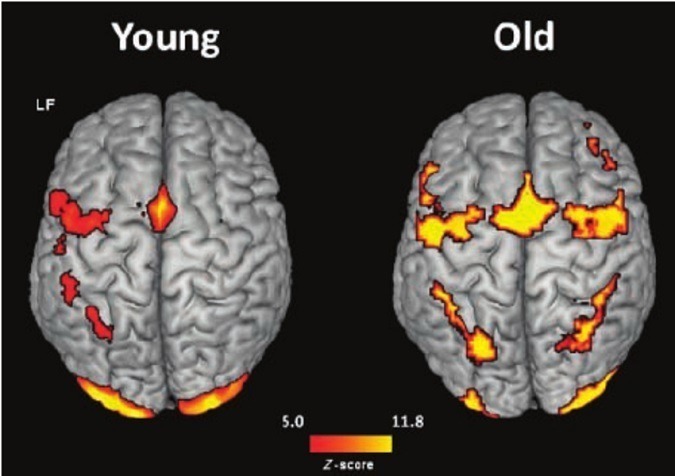Can trained older brains outperform untrained younger ones at demanding cognitive tasks? Quick answer: YES
 __________
__________
Online brain games can extend in-game ‘cognitive youth’ into old age (Science News):
“A University of California, Irvine-led study has found that online brain game exercises can enable people in their 70s and even 80s to multitask cognitively as well as individuals 50 years their junior. This is an increasingly valuable skill, given today’s daily information onslaught, which can divide attention and be particularly taxing for older adults…
The findings, published in Proceedings of the National Academy of Sciences, underscore the cognitive cost of multitasking, which dilutes function by splitting focus, as well as the ways in which people across the lifespan can overcome the brain drain brought on by both the increasingly cluttered multimedia environment and the natural aging process.
For the study, Steyvers and his colleagues partnered with Lumosity, an online platform that offers a variety of daily brain training games … Of the millions of people who played the game between 2012 and 2017, researchers randomly sampled the performance of about 1,000 users within two categories: those who ranged in age from 21 to 80 and had completed fewer than 60 training sessions; and adults 71 to 80 who had logged at least 1,000 sessions.
They found that the majority of older and highly practiced players were able to match or exceed the performance of younger users who had not played very much.”
The Study:
A large-scale analysis of task switching practice effects across the lifespan (Proceedings of the National Academy of Sciences)
- Abstract: An important feature of human cognition is the ability to flexibly and efficiently adapt behavior in response to continuously changing contextual demands. We leverage a large-scale dataset from Lumosity, an online cognitive-training platform, to investigate how cognitive processes involved in cued switching between tasks are affected by level of task practice across the adult lifespan. We develop a computational account of task switching that specifies the temporal dynamics of activating task-relevant representations and inhibiting task-irrelevant representations and how they vary with extended task practice across a number of age groups. Practice modulates the level of activation of the task-relevant representation and improves the rate at which this information becomes available, but has little effect on the task-irrelevant representation. While long-term practice improves performance across all age groups, it has a greater effect on older adults. Indeed, extensive task practice can make older individuals functionally similar to less-practiced younger individuals, especially for cognitive measures that focus on the rate at which task-relevant information becomes available.
The Study in Context:
- How learning changes your brain
- Can brain training work? Yes, if it meets these 5 conditions
- What are cognitive abilities and how to boost them?
- Solving the Brain Fitness Puzzle Is the Key to Self-Empowered Aging
- 10 neurotechnologies about to transform brain enhancement and brain health


